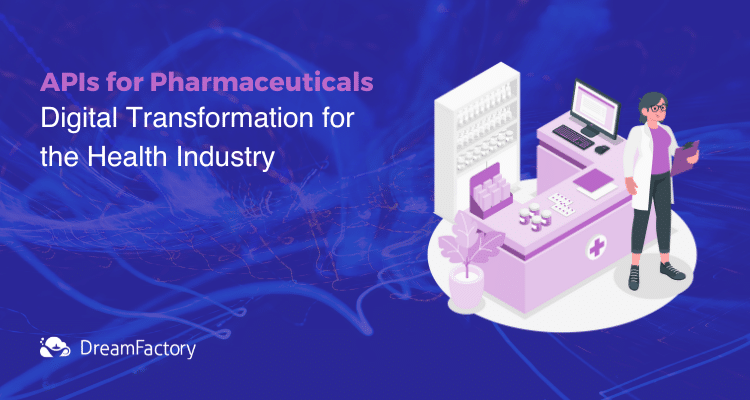Many pharmaceutical companies have been around for decades and must continually adapt to a rapidly evolving, technology-driven world. Even those that keep pace with digital trends often struggle with data silos and disparate systems, making it difficult to share information across platforms. This fragmentation hinders their ability to meet patient expectations, accelerate drug launches, and develop personalized therapies.
A key solution is the integration of APIs (Application Programming Interfaces), which enable seamless data sharing and drive innovation throughout the pharmaceutical value chain. Platforms like DreamFactory are already helping healthcare organizations leverage APIs to comply with new standards and unlock data-driven growth.
Table of Contents
- What Is an API and How Does It Work?
- Key Benefits of APIs for Pharmaceutical Companies
- Latest Trends in API Manufacturing (2025 Update)
- How DreamFactory Can Help
What Is an API and How Does It Work?
An Application Programming Interface (API) is a software intermediary that allows two or more applications or computers to communicate. APIs act as messengers, delivering requests and responses between systems—much like a waiter relays orders between a customer and the kitchen in a restaurant.
APIs are built from a set of functions and protocols that let applications access data and interact with external software, operating systems, or microservices. This connectivity is essential for integrating new technologies and ensuring interoperability across the healthcare ecosystem.
Tip: To learn more about API security and best practices, see our related article: API Security: Tips and Practices to Keep Your System Safe.
Related Reading: API Security: Tips and Practices to Keep Your System Safe
Key Benefits of APIs for Pharmaceutical Companies
APIs offer a range of benefits that address the modern challenges faced by pharmaceutical manufacturers:
- Data-Driven Insights
APIs enable pharma companies to connect and analyze data from clinics, research labs, and commercial operations. This leads to improved patient engagement, better recruitment for clinical trials, and more effective product launches56. - Efficient Partnerships and Collaboration
APIs streamline communication with external vendors, contract manufacturers, and research partners. This is crucial for clinical research, regulatory compliance, and expanding capabilities without heavy in-house investment511. - Seamless Mergers and Acquisitions
During M&A activity, APIs facilitate the integration of ERP, CRM, and other business systems, ensuring smooth transitions and uninterrupted operations25. - Automation and Scalability
Automation via APIs reduces manual processes, speeding up order fulfillment, supply chain management, and regulatory reporting. This efficiency supports scalability and helps address challenges like drug shortages or supply chain disruptions46.
Related Reading: Common Uses of APIs that Drive Innovation and Allow for Business Agility
Identifying Data-Driven Insights
As the healthcare industry continues to grow and evolve with modern technology, connecting data between clinics and commercial settings like pharma companies has become a necessity. In addition, pharma companies are also looking to garner better quality criteria and data-driven insights in order to increase sales and revenue. One of the simplest and most effective ways for pharma companies to achieve these data-driven insights is by implementing APIs.
For example, pharma companies can use APIs to record data and information on how patients are interacting with their current company’s services and therapies. Tracking this information can lead to better patient engagement, retention, and recruitment for pharma companies.
Connect Via Partnerships
Implementing APIs also allows pharma companies to connect more efficiently with external vendors or partnerships. For example, many organizations in the healthcare and pharmaceutical industries are partnering to conduct clinical research, examine active pharmaceutical ingredients, analyze raw materials and active ingredient life cycles, meet regulatory expectations, and develop additional capabilities that would otherwise take years to develop through in-house development alone.
Expand Via Mergers and Acquisitions
Mergers and acquisitions allow pharma companies to expand their product offerings and evolve faster than ever before. However, merging organizations can be a tedious and time-consuming process where data needs to be integrated across ERP systems, CRMs, etc.
To make this data integration process much more efficient, pharma companies can implement APIs to quickly and efficiently integrate data between multiple companies during a merger. Ultimately, utilizing APIs will ensure that pharma companies can maintain business operations throughout mergers and acquisition periods.
Scale With Automation
Another key benefit that APIs can provide to pharma companies is the ability to scale with automation. Simply put, automation saves time. Saving time also saves money. When pharma companies can utilize APIs to automatically sort through customer orders and fulfillment rather than manually sorting this information, they can get customer orders filled in less time. This allows pharma companies the opportunity to scale and generate more income in the process. It also allows them to address shortages, examine supply chain issues, analyze clinical trials, and try to meet other benchmarks that they otherwise wouldn’t have the time or resources to address.
Latest Trends in API Manufacturing (2026 Update)
The pharmaceutical industry is undergoing significant transformation, with several key trends shaping API manufacturing in 2025:
|
Trend |
Description |
|---|---|
|
Continuous Manufacturing |
Shifting from batch to continuous processes for greater efficiency, quality, and speed4511. |
|
Green Chemistry |
Emphasizing sustainability by minimizing waste and using eco-friendly processes4511. |
|
AI and Digitalization |
Leveraging AI, IoT, and blockchain for smarter R&D, real-time monitoring, and supply chain optimization611. |
|
Personalized Medicine |
Developing APIs for targeted therapies and specialty drugs, driven by advances in biotechnology59. |
|
Regulatory Compliance |
Meeting stricter FDA and EMA standards for safety, quality, and environmental impact411. |
|
Supply Chain Resilience |
Regionalizing production and increasing transparency to reduce risks from global disruptions911.These trends are driving pharmaceutical companies to adopt new technologies and processes, ensuring they remain competitive and compliant in a changing regulatory landscape. |
These trends are driving pharmaceutical companies to adopt new technologies and processes, ensuring they remain competitive and compliant in a changing regulatory landscape.
How DreamFactory Can Help
DreamFactory’s API integration platform empowers pharmaceutical companies to:
- Break down data silos and enable real-time data sharing.
- Accelerate digital transformation and support compliance.
- Automate workflows and improve operational efficiency.
- Scale solutions to meet the demands of modern pharmaceutical manufacturing.
Ready to see how APIs can transform your pharma business? Schedule a call with the DreamFactory team to consult with an API specialist and learn more about API suppliers, API manufacturing, and the evolving API market.
FAQs
- What are the biggest challenges in API manufacturing today?
The main challenges include high initial investments in technology, complex global supply chains, and stricter regulatory requirements4511. - How is sustainability being addressed in API production?
Companies are adopting green chemistry, reducing waste, and using renewable energy to minimize their environmental impact4511. - What role does AI play in pharma manufacturing?
AI is used for drug discovery, process optimization, supply chain management, and real-time monitoring of clinical trials611.
Sign up for a free trial today to see how DreamFactory can help you secure your API.
Terence Bennett, CEO of DreamFactory, has a wealth of experience in government IT systems and Google Cloud. His impressive background includes being a former U.S. Navy Intelligence Officer and a former member of Google's Red Team. Prior to becoming CEO, he served as COO at DreamFactory Software.
























 Blog
Blog

